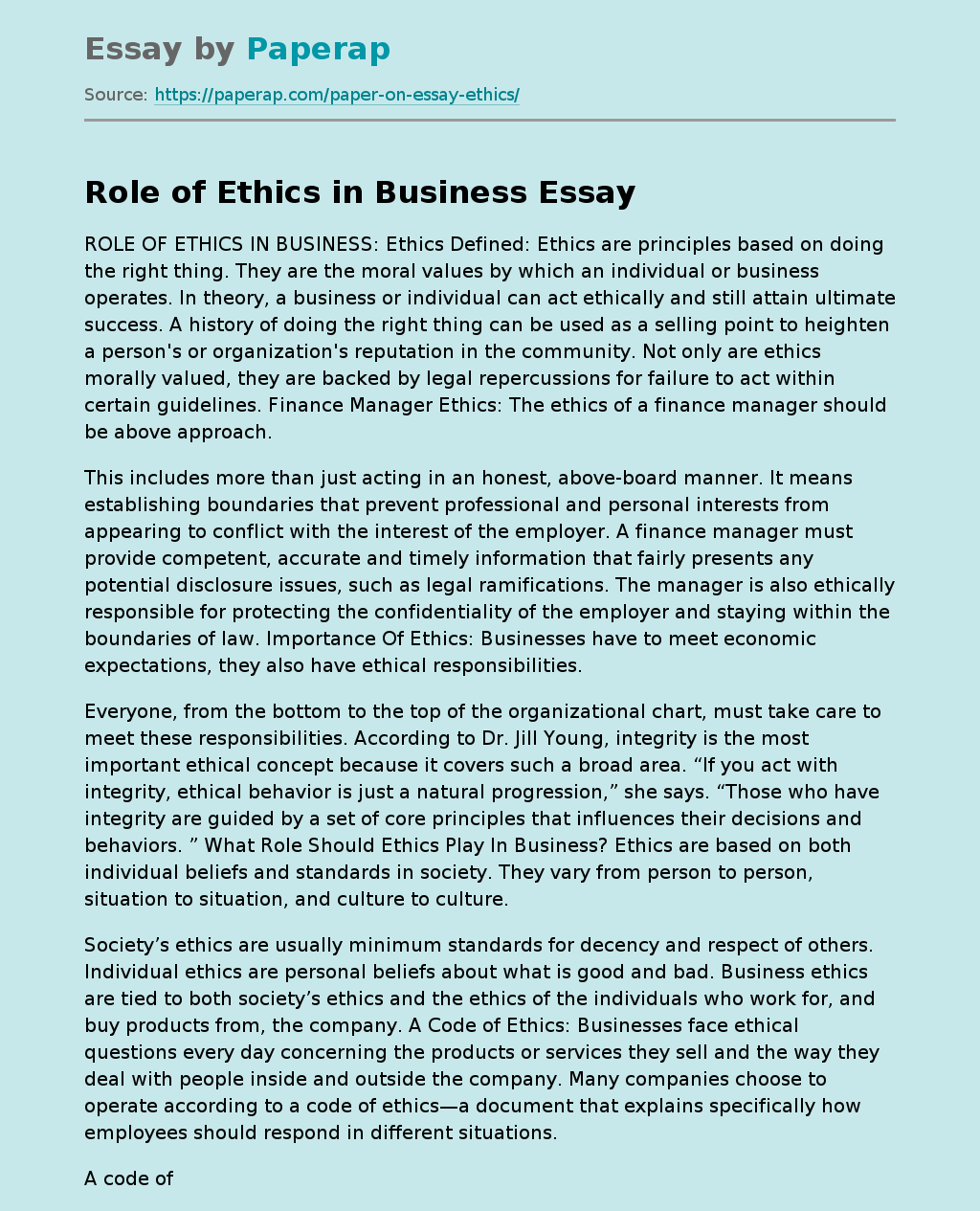Role of Ethics in Business
ROLE OF ETHICS IN BUSINESS: Ethics Defined: Ethics are principles based on doing the right thing. They are the moral values by which an individual or business operates. In theory, a business or individual can act ethically and still attain ultimate success. A history of doing the right thing can be used as a selling point to heighten a person’s or organization’s reputation in the community. Not only are ethics morally valued, they are backed by legal repercussions for failure to act within certain guidelines.
Finance Manager Ethics: The ethics of a finance manager should be above approach.
This includes more than just acting in an honest, above-board manner. It means establishing boundaries that prevent professional and personal interests from appearing to conflict with the interest of the employer. A finance manager must provide competent, accurate and timely information that fairly presents any potential disclosure issues, such as legal ramifications. The manager is also ethically responsible for protecting the confidentiality of the employer and staying within the boundaries of law.
Importance Of Ethics: Businesses have to meet economic expectations, they also have ethical responsibilities.
Everyone, from the bottom to the top of the organizational chart, must take care to meet these responsibilities. According to Dr. Jill Young, integrity is the most important ethical concept because it covers such a broad area. “If you act with integrity, ethical behavior is just a natural progression,” she says. “Those who have integrity are guided by a set of core principles that influences their decisions and behaviors.
” What Role Should Ethics Play In Business? Ethics are based on both individual beliefs and standards in society. They vary from person to person, situation to situation, and culture to culture.
Society’s ethics are usually minimum standards for decency and respect of others. Individual ethics are personal beliefs about what is good and bad. Business ethics are tied to both society’s ethics and the ethics of the individuals who work for, and buy products from, the company. A Code of Ethics: Businesses face ethical questions every day concerning the products or services they sell and the way they deal with people inside and outside the company. Many companies choose to operate according to a code of ethics—a document that explains specifically how employees should respond in different situations.
A code of ethics is especially useful when problems arise. For example: In the Chicago area in 1982, someone contaminated several bottles of Tylenol with poison, and seven people died as a result. This was the first case of product tampering of its kind. Johnson & Johnson, the manufacturer of Tylenol, followed its code of ethics and immediately pulled every package of the product off the shelves throughout North America, even though this was very expensive for the company. Johnson & Johnson also changed its packaging so it would be much more difficult for someone to contaminate the product in the future.
The recall and repackaging effort cost the corporation about US$100 million, but it also showed customers that the company cared about their safety. A code of ethics helps different people approach problems in the same way. Many companies have gone beyond simply writing a code and have established educational programs to help employees learn to behave more ethically. Program topics range from making personal calls during business hours to handling employee layoffs. The problem with creating and applying a code of ethics is that drawing a line between right and wrong isn’t always easy.
In Canada, the law details acceptable business behavior, but companies can still behave unethically without actually breaking the law. Like the law, no code of ethics can provide guidance for every possible situation. Although codes of ethics sometimes help people make decisions, they are not conclusive guides to distinguishing between right and wrong, and they are not necessary for every company. As a result, some would say that people should rely on their own judgment first. Principles of Admirable Business Ethics: 1.
Be Trustful: Recognize customers want to do business with a company they can trust; when trust is at the core of a company, it’s easy to recognize. Trust defined, is assured reliance on the character, ability, strength, and truth of a business. 2. Keep An Open Mind: For continuous improvement of a company, the leader of an organization must be open to new ideas. Ask for opinions and feedback from both customers and team members and the company will continue to grow. 3. Meet Obligations: Regardless of the circumstances, do everything in power to gain the trust of past customer’s and clients, particularly if something has gone awry.
Reclaim any lost business by honoring all commitments and obligations. 4. Have Clear Documents: Re-evaluate all print materials including small business advertising, brochures, and other business documents making sure they are clear, precise and professional. Most important, make sure they do not misrepresent or misinterpret. 5. Become Community Involved: Remain involved in community-related issues and activities. 6. Maintain Accounting Control: Take a hands-on approach to accounting and record keeping, not only as a means of gaining a better feel for the progress of company, but as a resource for any “questionable ” activities.
Gaining control of accounting and record keeping allows to end any dubious activities promptly. 7. Be Respectful: Treat others with the utmost of respect. Regardless of differences, positions, titles, ages, or other types of distinctions, always treat others with professional respect and courtesy. | “We must, therefore, consider the right way of performing actions, for it is acts, as we have said, that determine the character of the resulting moral states … ” (Aristotle)|
Role of Ethics in Business. (2019, Jun 20). Retrieved from https://paperap.com/paper-on-essay-ethics/

